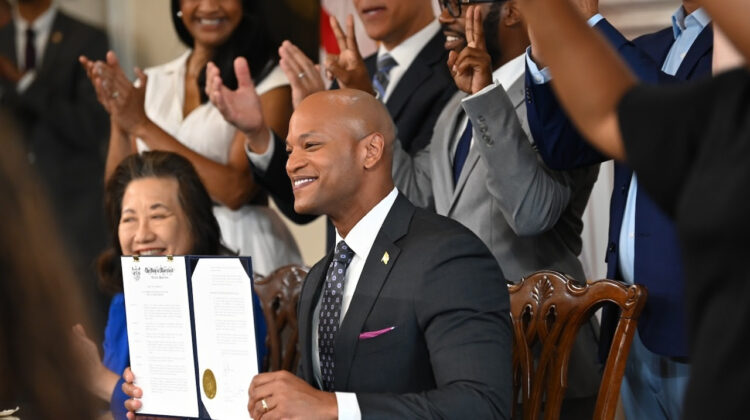
Image courtesy of governor.maryland.gov
Maryland Democratic Gov. Wes Moore made a groundbreaking decision last week to sign an executive order granting pardons to 175,000 individuals convicted of cannabis-related offenses in the state. The pardons automatically forgive low-level cannabis crimes spanning every misdemeanor cannabis possession charge the Maryland judiciary “can locate in the state’s electronic court records system,” according to a report by the Washington Post. The process identifies and clears eligible criminal records without the need for an application from the individual. They also cover every misdemeanor paraphernalia charge tied to the use or possession of cannabis.
“Maryland made history [in November 2022] when we legalized cannabis by referendum. But we cannot celebrate the benefits of legalization while forgetting the consequences of criminalization. No Marylander should face barriers to housing, employment, or education based on convictions for conduct that is no longer illegal,” Gov. Moore stated in a press release. “Today, we take a big step forward toward ensuring equal justice for all. But this won’t be our last effort. We must continue to move in partnership to build a state and society that is more equitable, more just, and leaves no one behind.”
This move places Maryland at the forefront of the national dialogue surrounding the impact of the War on Drugs and seeks to provide restitution to those whose lives it continues to affect. Historically, cannabis laws in Maryland, as in many states, have disproportionately targeted Black and Latino communities. These groups have faced higher rates of arrest and conviction for cannabis offenses despite similar usage rates compared to their white counterparts. The lingering effects of these convictions include barriers to employment, housing, and education – perpetuating cycles of inequality.
Maryland is the latest state to announce such pardons for cannabis offenses. It follows behind nine other states and multiple cities that have pardoned hundreds of thousands of old cannabis convictions in recent years, such as Colorado and Nevada. This signifies steps toward social justice. It also acknowledges the disproportionate impact of drug policies on marginalized communities, as well as sets a precedent for other states to consider similar measures.
The executive branch of the government typically grants pardons, offering official forgiveness for previous offenses. In contrast, the judicial branch authorizes expungements, which nullify criminal records completely. While Maryland’s 2017 law allows individuals with prior cannabis convictions to request expungement from the courts, there’s not much evidence suggesting widespread utilization of this provision.
Eligibility criteria for the pardons include:
- Convictions for misdemeanor possession of cannabis or misdemeanor use or possession with intent to use drug paraphernalia;
- Convictions for misdemeanor use or possession with intent to use drug paraphernalia were in cases associated with misdemeanor cannabis possession, and no other charges were incurred;
- Related disposition of guilty or probation before judgment;
- Charges occurring prior to January 1, 2023, when possession of personal use amount of cannabis was decriminalized.
The Office of the Governor shared some reactions to the decision, including one from pardon recipient Derek Liggins. “’When I was in my early 20s, I got a group of charges that included simple possession of marijuana. Thirty years later, I’m in a completely different place than I was. I’m an HVAC Field Supervisor at one of the largest mechanical companies in the DMV area. The possession charge limits my income because it prevents me from working on more lucrative government contracts,” said Liggins. “Criminal records are one of the main barriers to the Black community gaining wealth. I am very happy to see the progress in cannabis pardons; because we now see marijuana dispensaries on every corner, it doesn’t make sense that cannabis possession charges are still held against people.”
President Joe Biden issued a broader pardon proclamation in October 2022. In a statement, he announced plans to pardon federal cannabis simple possession offenses. He also urged governors to consider issuing similar pardons to those with cannabis convictions at the state level.
“Just as no one should be in a Federal prison solely due to the possession of marijuana, no one should be in a local jail or state prison for that reason, either,” he stated.
As other states and cities (hopefully) follow suit, the momentum for criminal justice reform continues to grow. This signals hope for a future where individuals convicted for actions now legal actions find rectification, allowing communities to thrive.


Leave a Reply